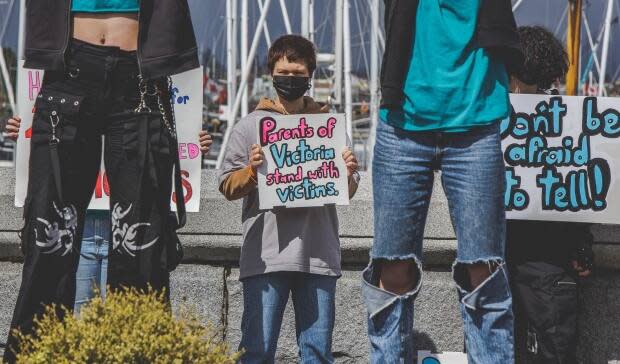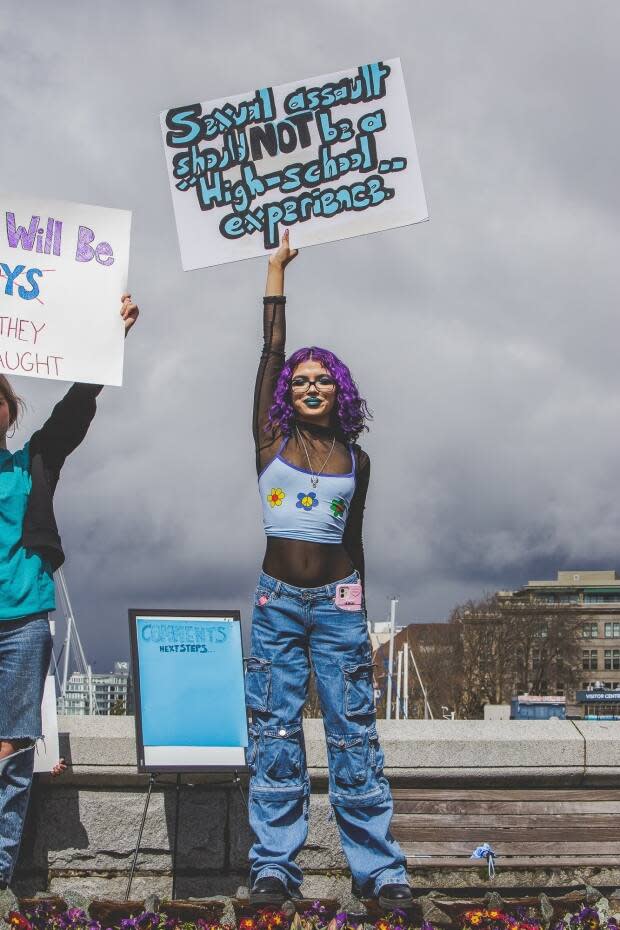B.C. students, parents call for better public school education about consent and sexual violence

Vancouver Island teens and their parents are worried the B.C. school system is not doing enough to educate students about consent and sexual violence and are calling on the province to take action.
On Sunday, roughly 30 students gathered outside the B.C. Legislature in Victoria to protest what they say is a lack of comprehensive education about consent in the current curriculum.
Their concerns are echoed by parent advisory councils in the Comox Valley School District, who are proposing resolutions to improve consent education at the B.C. Confederation of Parent Advisory Councils' annual general meeting on April 30.
Comox Valley lawyer Shannon Aldinger, a mother of teenagers and a member of her local and district parent councils, said Wednesday on CBC's On The Island that bold action is needed given that teenage girls between age 15 and 17 are most at risk of sexual violence.
Statistics Canada data shows one in four girls and one in eight boys have been sexually abused by the time they are 18.
"What we need is to actually include consent as a mandatory part of the curriculum at every grade," said Aldinger.

According to the Ministry of Education and Child Care, the physical and health education (PHE) curriculum talks about inappropriate touching and respectful behaviour as early as kindergarten.
In a statement, the ministry said in Grade 1, students learn to prevent and respond to unsafe situations, in Grade 4 they learn about luring and potential abusers, in Grade 7 they learn strategies to prevent sexual exploitation and harm, and in Grade 10 they "propose strategies" for avoiding and responding to abuse.
The ministry said it has partnered with the B.C. Teachers' Federation to create support resources for teachers about sexual health and supported the development of Respectful Futures – a learning resource about relationships for students in Grades 6-12.
"Our curriculum provides many avenues to teach consent, and a number of school boards have taken innovative and unique approaches to provide educators with tools for the subject," Education Minister Jennifer Whiteside said in an email.
Aldinger said the problem with these supplementary resources is they are not very comprehensive and are taught voluntarily.
She also said PHE is optional for students after Grade 10 so consent education is not mandatory at higher high school grades.

Piper Nichols, a Grade 11 student at Oak Bay High School who organized the Sunday rally, said while consent was discussed in her early years of high school, the focus was primarily on "drunk consent isn't consent" and to her, that was not comprehensive enough.
"I noticed a lot of my fellow students struggling to recognize really what consent was," said Nichols, speaking Monday on On The Island.
She also said the pandemic, which prevented teens from socializing, means her peers may have gone through high school without being in as many situations where consent came up.
"People are going into university not having experienced any of this ... you're just setting them up for failure, you're setting them up to have bad experiences when you know we have the power to change that," said Nichols.
Aldinger said the resolutions being put forward by Comox parents would help. They include extending mandatory consent education to all high school grades, establishing a province-wide protocol on sexual harassment in schools and creating policies on reporting and responding to student complaints of peer- to-peer sexual violence and tracking data.
On a national scale, the consent action team at Ryerson University in Toronto also launched a campaign this week called High School Too.
It calls on school boards and governments across the country to take action to end sexual violence in schools by ensuring comprehensive consent education at all grade levels. It also calls for the creation of a national consent awareness week.
Hundreds of students also walked out of class in Calgary on Monday morning to raise awareness about sexual violence and demand change in their education system.


